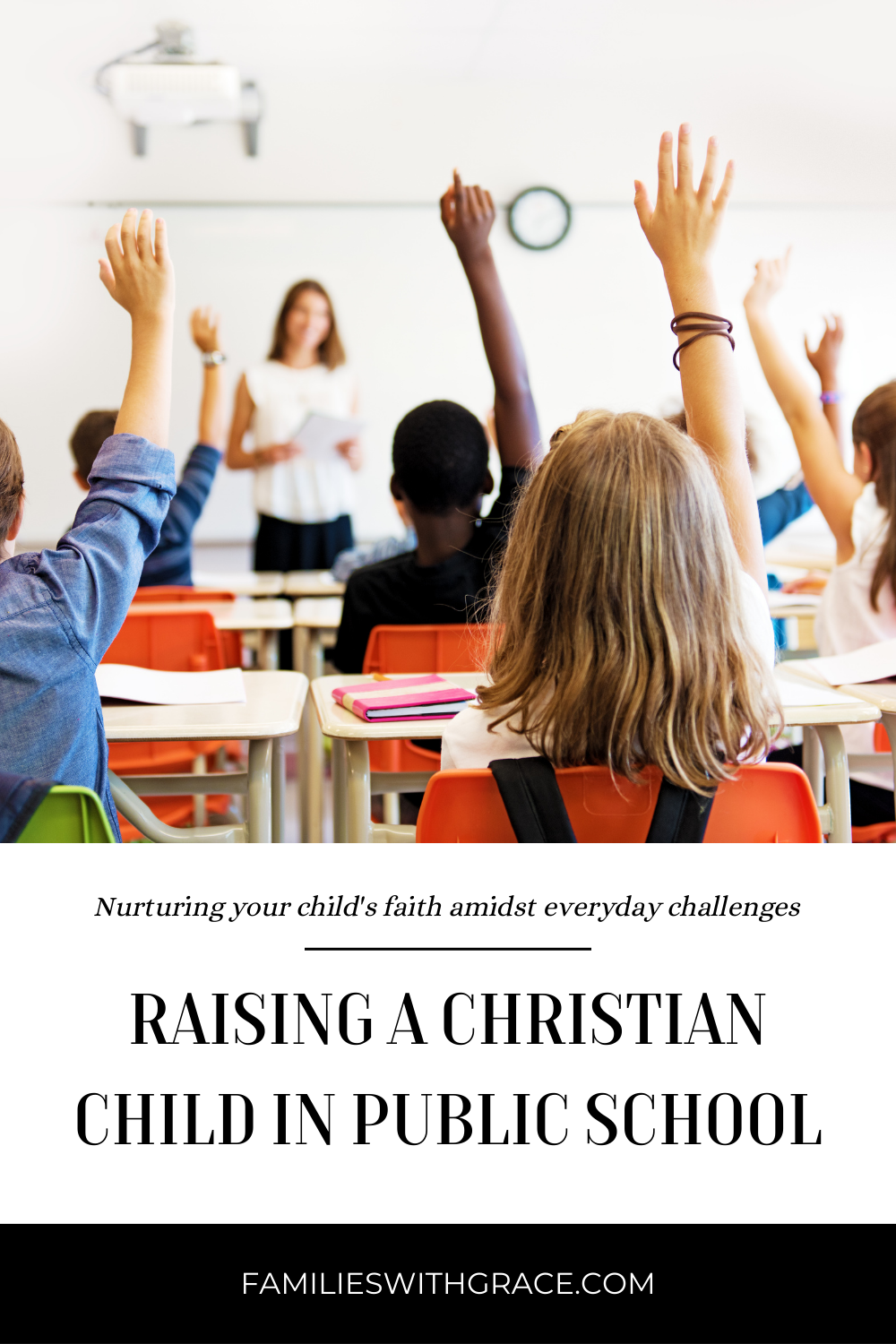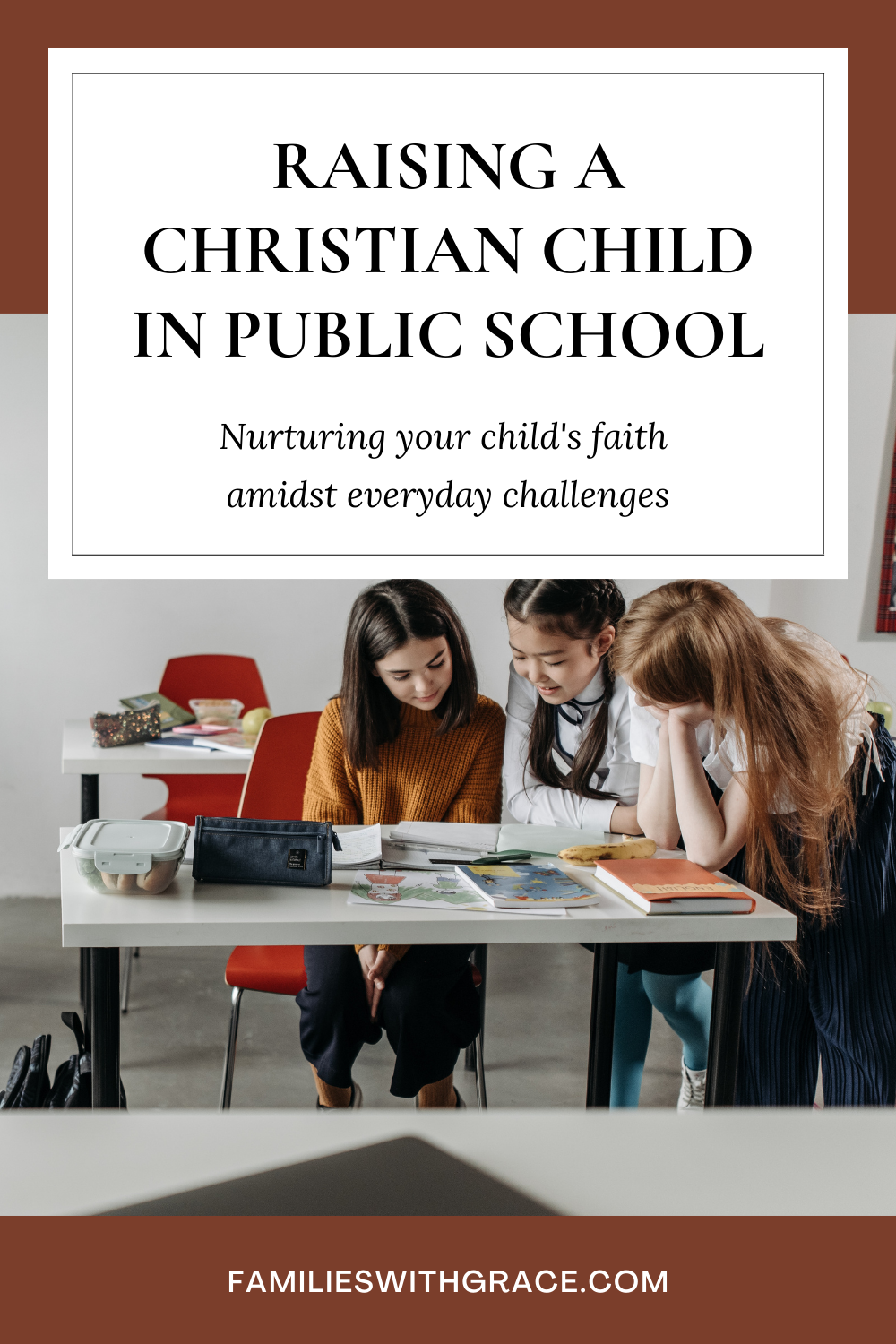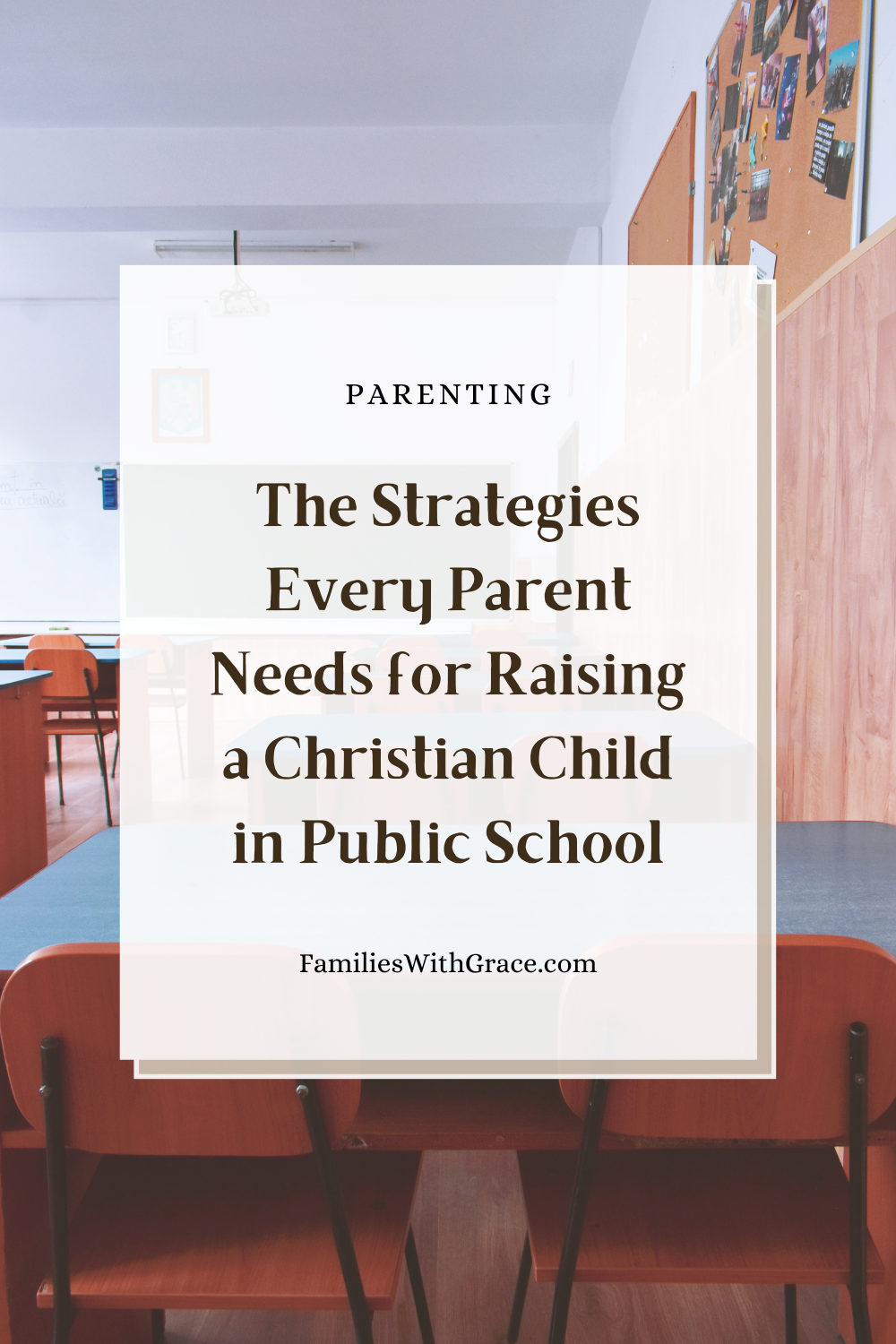Nurturing your child’s faith amidst everyday challenges
When my husband and I discussed plans for our children long before they existed, our conversation included school. We knew the options available and decided public school was the best choice for us. Both of us were raised as Christian children in public schools, and we knew it was possible to do just that.
Each family has to make their own education choices based on beliefs and practicality. But, for us and many other Christian families like ours, public school is the right and best choice. We had about a year and a half of virtual schooling during the height of COVID, because that was right for our family. At the end of that period, I knew public school continued to be the correct choice for our family.
However, raising a Christian child in public school does take some thought and intentions. I want my children to get a great education — and they are. I also want them to be grounded in their beliefs — which they also are. Together, my husband and I work to make sure their education at school and at home are the best they can be.
Cultivating a strong foundation of faith at home
As Christian moms and dads, teaching our children about God is our most important task. This is even more important for children going to public school. I know my children’s school isn’t going to teach them about faith. In fact, I’m glad for that! My husband and I along with our church have that responsibility.
And these words that I command you today shall be on your heart. You shall teach them diligently to your children, and shall talk of them when you sit in your house, and when you walk by the way, and when you lie down, and when you rise. You shall bind them as a sign on your hand, and they shall be as frontlets between your eyes. You shall write them on the doorposts of your house and on your gates.
Deuteronomy 6:6-9 (ESV)
From the beginning of the Bible, God instructs us to teach our children about Him as we are doing everything. Raising a Christian child in public school starts with nurturing their faith at home.
Working these things into your daily routines helps you instill them in your children even more. Family devotionals are a great way to spark conversation about God. Listening to Christian music shifts everyone’s thoughts to God. I especially love to hear my kids going around singing about Jesus because those are the songs in their heads!
We also make God a normal part of conversation. We encourage our children to ask questions, and we share with them how we experience God at work in our own lives.
Equipping your child for the challenges
My husband and I know our kids will face challenges as Christians in a public school. In fact, their school is not only a public school but is tied into a university and has more liberal leanings as a result. So, we use these things for open conversations and have ever since they were in kindergarten.
Educational material
While some parts of their education is completely fact based, like math and grammar, other parts are more up for debate. One great example of this is creationism versus evolution. Our family has had multiple discussions about this. We’ve spent time truly delving into what the Bible says and how science really does back it up.
As my children head into 5th and 8th grades this coming school year, they may continue to have educational topics arise that don’t align with what we believe. We will continue to talk about those things with them. I always want my children to feel comfortable questioning things. They challenge my husband and me to find answers sometimes!
One thing I’ve learned in all my decades as a Christian is that God stands up to questions. No matter what school is teaching my children, if we are exploring it from a faith-based perspective at home and examining the topic deeply, I know all answers lead back to God. If they didn’t, then He wouldn’t be worthy of my worship and devotion!
This all results in our children learning to ask questions and stand in their faith from an early age. We’ve found that they understand more then we expected so many times. As Christian moms and dads we need to do our best to listen to our children and really answer their questions. It will nurture our children’s faith and our own!
Classmates
Another issue that definitely comes up when raising a Christian child in public school is their classmates. Not everyone is going to come from a Christian home. In fact, I’d say my children are in a minority at their school. The majority of families don’t have strong religious beliefs. They’ve encountered issues as a result.
For example, this past school year, my son came home upset because he heard a classmate declare he hates Christians. So we talked about it. We talked about how his classmate was certainly entitled to his opinions, but saying those things out loud are hurtful. We used it as an example for how important the words we use are. In dealing with classmates and friends, we want to show love and be an example of kindness — not hurt feelings.
Having classmates from different backgrounds have brought up secular topics as well that we have discussed as a family. We share our beliefs and why we believe how we do. But, we always come back to the message of love. I want my children to love others. No strings attached. No judgment or condemnation. Love like Jesus is our message. I tell my kiddos that they have never looked into the face of someone Jesus doesn’t love.
These encounters also give us an opportunity to nurture our kids’ resilience. They are going to be met with adversity throughout life whether for their faith or something else. Learning to let go of that barb and move forward is a life skill they need.

Friends
And then there are classmates that our kids grow close to. Friends can be both a blessing and a challenge. Not all of our children’s friends are Christians. We are OK with that. We continue with our conversations about different beliefs. Then we also talk about the usual parent things of making the right choices when they are at a friend’s house. For example, if the friend wants to watch something our kids know wouldn’t be allowed at home, then they say no and suggest something else.
All of my children’s friends know they are Christians. My kids have talked about God and their relationship with Him to their friends, in fact. While not all of them believe the same way, they have all respected my children’s beliefs.
Just like with anything else, talking about peer pressure and the challenges of friendship with others come into play. But, I think that would happen whether you are raising a Christian child in public school or raising a Christian child at a private school.
Partnering with the school
I may not be teaching my children myself, but I can still be involved in their education. We talk about curriculum. And we maintain an attitude of partnering with the school. Both my husband and I have volunteered for a variety of activities. In fact, I almost always go along as a field trip chaperone and volunteered at class parties when they were younger.
My children’s teachers know us. We maintain communication. Since my youngest is dyslexic, we have even more communication. We respect our children’s teachers, and they respect us in return. Having an attitude of partnership rather than adversaries only benefits our children.
And our school has been open to faith-based things. For example, my daughter has always been passionate about food banks. When she was in 4th grade, she held a food drive to benefit the food pantry at a local church. We were clear with the school where the food was going, and everyone was on board with it.
Embracing the mission field of the school community
When you’re raising a Christian child in public school, you really can think of it as a mission field. Honestly, anywhere we are is a mission field, right? But, this doesn’t mean going around preaching all the time or encouraging our children to do that. Nobody wants to be preached at!
Instead, we live our lives with integrity and an attitude of Christ that others may see — or they may not. One of my favorite things has been to send lunchbox notes to my children. I have themes for each day of the week, because otherwise I’d run out of things to say! Every Tuesday is what I call “Truth Tuesday,” and I put a Bible verse in their lunchbox note. I do this for my own kiddos to help them remember God’s Word.
However, it also has had an impact outside of my children. From at least 1st grade on, my daughter’s entire lunch table has read her notes. I didn’t learn about that until 2nd or 3rd grade. I knew they read the note sometimes, but I didn’t know it was daily. They continue to do that even now going into 8th grade. So at least every Tuesday, these kids are encountering a Bible verse as a result. Does that make a big difference in their lives? Maybe. I know God is powerful and can move in ways we don’t even know about.
Celebrating faith victories
Just like we talk with our kids about mistakes they’ve made, we also need to acknowledge the positive things they’ve done and celebrate with them. Take the time to point out when you see them acting in a Christian manner toward a classmate. Give them a big hug when they share about how they included a classmate everyone else was being mean to.
Of course you also want to celebrate any of their friends or classmates coming to know Jesus as personal Savior or having an interest in faith. We’ve experienced this with both of our children. And in maintaining open conversation with our kids about faith, we’ve been able to answer their questions as they are navigating talking about their faith.
Sharing our faith and living a life for Christ can be challenging even for adults. Celebrating the good things with our kids encourages and nurtures their faith. It reinforces lessons they will hopefully carry with them into adulthood.
Final thoughts
Raising a Christian child in a public school can be challenging, but with the right mindset and intentional actions, we can nurture their faith amidst the everyday challenges. By cultivating a strong foundation at home, equipping our children for the challenges they may face, partnering with the school, embracing the school community as a mission field and celebrating faith victories, we can make a lasting impact in their lives and the lives of those around them.
So, let’s continue to pour God’s love into our children, equip them to shine their light and trust that He will guide them each step of the way. Together, we can navigate the public school journey with confidence, knowing that our faith and love will make a difference in the lives of our children and the world they inhabit.
Find more Christian parenting articles:
5 Characteristics of good mothering for Christian moms
How Christian mothers can teach their children about God
10 Ways to have a family live filled with grace, love and faith
Grace-filled sibling relationships
Connect with other Christian moms just like you








